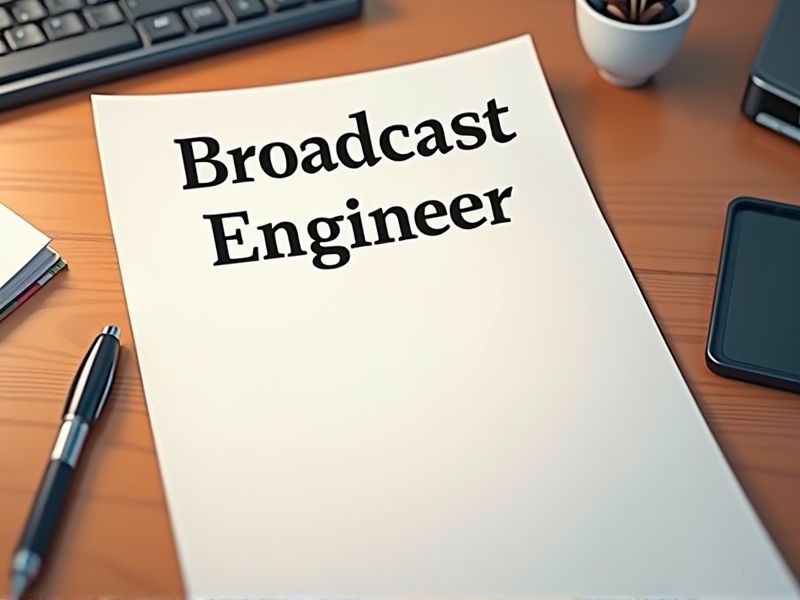
Broadcast Engineers play a critical role in ensuring seamless transmission and high-quality audio-visual content by handling sophisticated broadcast equipment. Obtaining specific certifications validates their technical expertise and knowledge, which is essential for system reliability and industry compliance. Certifications also enable engineers to stay current with evolving technologies and standards in the broadcast industry. Some essential certifications that may be required for Broadcast Engineers include the following.
Society of Broadcast Engineers (SBE) Certified Broadcast Engineer
Having a Certified Broadcast Engineer (CBE) demonstrates a proven level of technical expertise and commitment to professional standards, which is often a requirement for employers. Certification from the Society of Broadcast Engineers (SBE) assures employers that the individual maintains up-to-date knowledge of industry best practices and evolving technologies. The certification process involves rigorous examinations, verifying a professional's capacity to address technical challenges effectively. SBE's recognition supports career advancement by distinguishing certified engineers from their peers in a competitive job market.
FCC General Radiotelephone Operator License (GROL)
The FCC General Radiotelephone Operator License (GROL) is required for broadcast engineers to ensure compliance with federal regulations when operating or maintaining certain radio transmitters. Holding a GROL validates the technical competency needed to manage complex communication systems used in broadcasting. Without this license, broadcasting professionals cannot legally perform transmitter adjustments and troubleshooting activities. Acquiring the GROL leads to a standardized level of technical knowledge and enhances the overall reliability of broadcast operations.
SBE Certified Audio Engineer
Certified expertise in audio engineering ensures that broadcast engineers maintain high-quality sound standards during transmissions. Sound quality directly impacts audience retention and overall content perception. Inaccurate audio mixing or signal distortion can lead to viewer dissatisfaction and brand damage. Hiring a certified audio engineer minimizes error potential, ensuring reliable audio delivery and enhancing the broadcast's professional reputation.
SBE Certified Television Engineer
SBE Certified Television Engineer ensures a broadcast engineer has the technical knowledge required for effective television broadcasting. Certification validates a professional's capability to manage complex broadcasting equipment and systems. Industry standards often require certification to comply with regulatory and operational benchmarks, reducing the risk of technical failures. Having certified engineers helps organizations maintain broadcast quality and reliability, enhancing audience satisfaction and trust.
CompTIA A+ Certification
The CompTIA A+ Certification provides foundational IT knowledge crucial for a Broadcast Engineer, facilitating the management of digital broadcasting systems which heavily rely on computer technology. This certification ensures expertise in essential hardware and software troubleshooting, which is critical for maintaining uninterrupted broadcast operations. Understanding networking concepts from the certification aids broadcast engineers in configuring and maintaining complex audio and video networks. Many employers prefer or require this certification as it verifies an individual's technical competence and commitment to professional development in an evolving broadcast industry.
CompTIA Network+ Certification
A Broadcast Engineer is responsible for maintaining the infrastructure needed for effective signal transmission, and the CompTIA Network+ Certification provides foundational networking knowledge essential for this role. Understanding network architectures and troubleshooting network issues ensures smooth broadcast operations, minimizing downtime. Certification in network essentials enhances the engineer's ability to integrate modern digital broadcasting technologies that rely heavily on network connectivity. Validating network skills with CompTIA Network+ supports the industry's evolving technical demands, often making certified professionals more competitive in the job market.
Cisco Certified Network Associate (CCNA)
Broadcast engineers need a solid understanding of networking technologies to ensure seamless signal transmission and the Cisco Certified Network Associate (CCNA) provides this essential knowledge. With networking equipment increasingly integral to broadcast operations, CCNA certification equips engineers with skills to troubleshoot and optimize these systems. CCNA certification enhances a broadcast engineer's ability to implement robust security protocols, vital for protecting sensitive data and communications. As the industry leans towards IP-based broadcasting, CCNA expertise becomes crucial for engineers adapting to this technological transition.
Certified Technology Specialist (CTS)
Obtaining a Certified Technology Specialist (CTS) credential equips broadcast engineers with a validated understanding of the latest AV technology standards. With technology rapidly evolving, a CTS certification ensures engineers stay current with industry trends, enhancing performance and productivity. Employers value the structured expertise a CTS offers, potentially leading to career advancement and salary increases. CTS certification often signifies a commitment to professional growth, which can differentiate broadcast engineers in a competitive job market.
BICSI Registered Communications Distribution Designer (RCDD)
Broadcast engineers need a BICSI Registered Communications Distribution Designer (RCDD) to ensure that complex network designs adhere to industry standards and best practices. The expertise of an RCDD in structured cabling systems is critical for optimizing signal distribution and minimizing downtime in broadcast environments. Compliance with these standards also reduces the risk of costly rework and technical issues during live broadcasts. A qualified RCDD designer plays a vital role in future-proofing broadcast facilities by integrating scalable infrastructure for evolving technologies.
Audio Engineering Society (AES) Certification
AES Certification validates technical expertise, ensuring broadcast engineers possess industry-standard knowledge crucial for operating and maintaining audio equipment. The certification process often requires proficiency in current technologies and practices, fostering a direct link to reliable and consistent broadcast quality. Employers recognize certified professionals as more competent, likely leading to increased job opportunities and higher pay scales. Certification also provides a framework for ongoing education, aligning skills with evolving industry advancements.
Summary
When you pursue certifications as a Broadcast Engineer, your skills will likely gain more credibility in the industry. This increased recognition can lead to enhanced job opportunities and potentially higher salaries. Certifications often equip you with updated knowledge of current technologies and industry standards. Employers might be more inclined to trust your expertise, knowing you meet certified standards.
